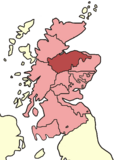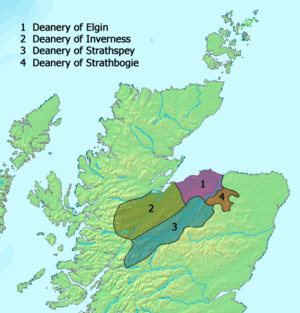Diocese of Moray facts for kids
 |
|
| Head | Bishop of Moray |
|---|---|
| Archdeacon(s) | Archdeacon of Moray |
| Known rural deans | Elgin, Inverness, Strathbogie, Strathspey |
| First attestation | 1114 x 1120 |
| Metropolitan before 1472 | None |
| Metropolitan after 1492 | Archbishop of St Andrews |
| Cathedral | Elgin Cathedral |
| Previous cathedral(s) | Birnie, Kinneddar and Spynie |
| Dedication | Holy Trinity |
| Canons | Secular |
| Catholic successor | Merged into resurrected Diocese of Aberdeen, 4 March 1878 |
| Episcopal successor | Diocese of Moray, Ross and Caithness |
The Diocese of Moray was a very important part of the Roman Catholic Church in Scotland during the Middle Ages. It covered a large area in central northern Scotland. A diocese is like a special church district led by a bishop.
Contents
History of the Moray Diocese
The Diocese of Moray started in the early 1100s. It was created by King David I of Scotland. The first bishop was named Gregoir. The diocese stopped existing in 1638 and was never restarted as a Catholic diocese.
Important Bishops of Moray
Many bishops helped shape the Diocese of Moray. Bishop Bricius set up how the church would work. Bishop Andreas made the church stronger by getting more important roles and gaining lots of land. He received this land from his family, the powerful de Moravia lords, and from the king. Bishop Andreas also changed the cathedral's rules to be like those of Salisbury Cathedral in England.
Another very important bishop was Alexander Bur (who was bishop from 1362 to 1397). He bravely fought to protect the church's land and property. He stood up against a powerful and sometimes harsh lord called Alexander Stewart, Earl of Buchan, who was also known as the "Wolf of Badenoch."
The last Roman Catholic bishop was Patrick Hepburn. He sold off almost all of the church's lands. This happened around the time of the Scottish Reformation, a big change in Scotland's religious history.
Area and Church Districts
The Diocese of Moray covered a huge area. It stretched from Huntly in the east to close to the Knoydart Peninsula in the west. In the southwest, it reached the Atlantic Ocean.
This large area was divided into four smaller church districts called deaneries. These were Elgin, Inverness, Strathbogie, and Strathspey. Each deanery had many local churches called parishes.
Cathedrals of Moray
A cathedral is the main church of a diocese, where the bishop has his special chair. The early bishops of Moray did not have one fixed cathedral. Instead, they used different church centers as their main spots. These places included Birnie, Kinneddar, and later Spynie.
Spynie Cathedral
Bishop Bricius de Douglas finally got permission from Pope Innocent III to make the Church of the Holy Trinity at Spynie the permanent cathedral. This happened on April 7, 1206.
He also got permission to create a group of eight priests, called a chapter, to help run the cathedral. This group based its rules on those of Lincoln Cathedral in England.
Elgin Cathedral
Bishop Bricius thought Spynie was too far away from the people it served. He wanted to move the church to a safer place, Elgin. However, the move only happened after he died. Bishop Andreas de Moravia completed the move with permission from Pope Honorius III and King Alexander II on July 19, 1224.
 | Frances Mary Albrier |
 | Whitney Young |
 | Muhammad Ali |


